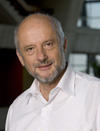EVMS
 |
| Pier Oddone |
Earned Value Management (EVM) is a methodology for integrating scope, schedule and resources to measure the performance and progress of projects against an agreed-to baseline plan. The system that is put in place to implement this methodology is EVMS.
Earned Value concepts started in the 60s during the development of large projects. The basis for these concepts is very simple: how much value have we created with what effort, and do these match our plan at a given stage? Implementing an accurate measurement system, however, is not simple. At Fermilab we have applied these concepts for a number of years to our projects, but not to their full extent and power. EVMS is now considered best practice and is the standard adopted by the federal government and the project management industry. To carry out large projects in the future, FRA needs to be certified as meeting the ANSI/EIA-748-B Earned Value Management Systems standard.
We certainly stand to gain from being certified to national standards as we have in the environmental and health and safety areas. The more we adopt best practices and national standards the more straightforward and transparent will be our interactions with our sponsors and with industry. The system will keep everyone--project managers, other members of the project team, and upper level management (Laboratory & DOE)--informed as to the near-real-time performance of projects. This information allows an understanding of the final projected cost at completion, and provides warning as problems arise or trends develop to allow corrective actions in order to deliver the project on schedule and within budget.
The EVMS Core Team working on developing the system consists of eleven people and is led by Dean Hoffer and Elaine McCluskey. EVMS has been first implemented for the NOvA project, which has followed its procedures and reporting requirements over the last six months. Dean, Elaine and John Cooper, the NOvA project manager, have been relentlessly driving their teams in developing the EVMS program and getting it operational in NOvA. The EVMS performance metrics make up a major part of the NOvA monthly reports.
A team of approximately a dozen people from DOE's Office of Engineering & Construction Management, which monitors EVMS compliance, will descend upon Fermilab for the entire week of May 11-15 to prod, probe, question, interview and understand our program and NOvA's implementation, culminating in recommendations that FRA will have to address in order to receive certification under the ANSI standard.
We have worked hard in preparing and implementing our EVMS program (pdf). We welcome the OECM Certification Review Team and we look forward to their recommendations to help us better implement this important management tool.
|